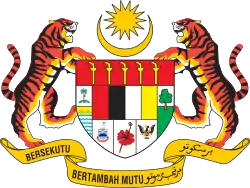Ministry of Human Resources (Malaysia)
The Ministry of Human Resources (Malay: Kementerian Sumber Manusia), abbreviated MOHR, is a ministry of the Government of Malaysia that is responsible for skills development, labour, occupational safety and health, trade unions, industrial relations, industrial court, labour market information and analysis, social security.
| Kementerian Sumber Manusia (MOHR) | |
 Coat of arms of Malaysia | |
| Ministry overview | |
|---|---|
| Formed | 31 August 1957 |
| Preceding Ministry |
|
| Jurisdiction | Government of Malaysia |
| Headquarters | Level 6-9, Block D3, Complex D, Federal Government Administrative Centre, 62530 Putrajaya |
| Employees | 8,611 (2017) |
| Annual budget | MYR 1,240,485,000 (2017) |
| Minister responsible | |
| Deputy Minister responsible |
|
| Ministry executive |
|
| Website | www |
| Footnotes | |
| Ministry of Human Resources on Facebook | |
Organisation
- Minister of Human Resources
- Deputy Minister of Human Resources
- Secretary-General
- Under the Authority of Secretary-General
- Legal Division
- Internal Audit Unit
- Corporate Communication Unit
- Key Performance Indicator Unit
- Integrity Unit
- Deputy Secretary-General (Policy and International)
- Policy Division
- Institute of Labour Market Information and Analysis
- International Division
- National Wages Consultative Council
- Deputy Secretary-General (Operations)
- Development, Financial and Human Resources Division
- Management Services Division
- Account Division
- Information Management Division
- Inspectorate and Enforcement Division
- Under the Authority of Secretary-General
- Secretary-General
- Deputy Minister of Human Resources
Federal departments
- Department of Labour of Peninsular Malaysia, or Jabatan Tenaga Kerja Semenanjung Malaysia (JTKSM). (Official site)
- Department of Occupational Safety and Health (DOSH), or Jabatan Keselamatan dan Kesihatan Pekerjaan (JKKP). (Official site)
- Industrial Court of Malaysia, or Mahkamah Perusahaan Malaysia. (Official site)
- Manpower Department, or Jabatan Tenaga Manusia (JTM). (Official site)
- Department of Skills Development (DSD), or Jabatan Pembangunan Kemahiran. (Official site)
- Centre for Instructor and Advanced Skill Training (CIAST), or Pusat Latihan Pengajar dan Kemahiran Lanjutan. (Official site)
- Department of Trade Union Affairs, or Jabatan Hal Ehwal Kesatuan Sekerja (JHEKS). (Official site)
- Department of Labour Sarawak, or Jabatan Tenaga Kerja Sarawak. (Official site)
- Department of Labour Sabah, or Jabatan Tenaga Kerja Sabah. (Official site)
- Department of Industrial Relations Malaysia, or Jabatan Perhubungan Perusahaan Malaysia (JPP). (Official site)
- Productivity-Linked Wage System (PLWS), or Sistem Upah yang Dikaitkan dengan Produktiviti. (Official site)
Federal agencies
- Social Security Organisation (SOCSO), or Pertubuhan Keselamatan Sosial (PERKESO). (Official site)
- Human Resources Development Fund (HRDF), or Kumpulan Wang Pembangunan Sumber Manusia (KWPSM). (Official site)
- National Institute of Occupational Safety and Health (NIOSH), or Institut Keselamatan dan Kesihatan Pekerjaan Negara. (Official site)
- Skills Development Fund Corporation, or Perbadanan Tabung Pembangunan Kemahiran (PTPK). (Official site)
- Institute of Labour Market Information and Analysis (ILMIA), or Institut Maklumat Dan Analisa Pasaran Buruh. (Official site)
Key legislation
The Ministry of Human Resources is responsible for administration of several key Acts:
- Occupation and Labour Standards
- Employment Act 1955 [Act 265]
- Labour Ordinance (Sabah Cap. 67)
- Labour Ordinance (Sarawak Cap. 76)
- Workers’ Minimum Standards of The Housing and Amenities Act 1990 [Act 446]
- Children and Young Persons (Employment) Act 1966 [Act 350]
- Private Employment Agencies Act 1981 [Act 246]
- Anti-Trafficking in Persons Act 2007 [Act 670]
- Employment (Restriction) Act 1968 (Revised 1988) [Act 353]
- Employment Information Act 1953 [Act 159]
- Holidays Act 1951 [Act 369]
- Weekly Holidays Act 1950 [Act 220]
- Holidays Ordinance (Sabah Cap. 56)
- Public Holidays Ordinance (Sarawak Cap. 8)
- Occupational Safety and Health
- Factories and Machinery Act 1967 [Act 139]
- Petroleum (Safety Measures) Act 1984 [Act 302]
- Occupational Safety And Health Act 1994 [Act 514]
- Industrial Relations
- Industrial Relations Act 1967 [Act 177]
- Trade Unions Act 1959 [Act 262]
- Social Security
- Employees' Social Security Act 1969 [Act 4]
- Workmen’s Compensation Act 1952 [Act 273]
- National Wages Consultative Council Act 2011 [Act 732]
- Minimum Retirement Age Act 2012 [Act 753]
- Skills Development
- Pembangunan Sumber Manusia Berhad Act 2001 [Act 612]
- Skills Development Fund Act 2004 [Act 640]
- National Skills Development Act 2006 [Act 652]
Vision
To be the leading agency in the development and management of a world class workforce.
Mission
- To grow and increase a workforce that is productive, informative, discipline, caring and responsive to the changing labor environment towards increasing the economic growth and hence create more job opportunities.
- To encourage and maintain conducive and harmonised industrial relationships between employers, employees and trade unions for the nation's economic development and wellness of people.
- To uphold social justice and ensure harmonious industrial relations through solving industrial dispute between employer and employee and awarding collective agreement.
- To ensure trade unions practice democracy in an orderly manner and is responsible to assist achieving the objective of industrial harmony.
- To be the leader in development of nation's human resources.
- To ensure safety and health of workforce is assured.
- To develop skilled, knowledgeable and competitive workforce in a harmonious industrial relations with social justice.
References
External links
This article is issued from Wikipedia. The text is licensed under Creative Commons - Attribution - Sharealike. Additional terms may apply for the media files.